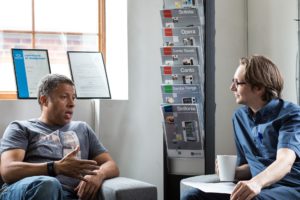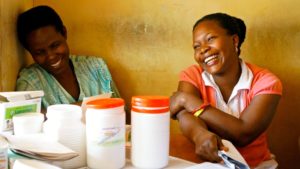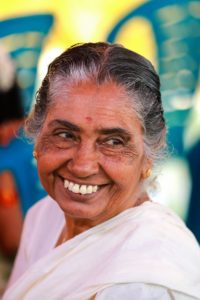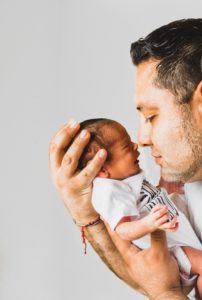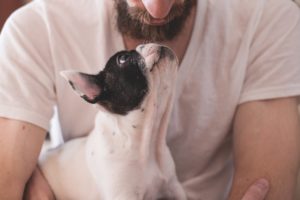The IMSR is passionate about including diverse public, patient and lived experience voices in our work.
We are also committed to raising aspirations and engaging with young people interested in pursuing or learning more about STEM careers. Find out more about the activities we run for communities and young people on our Projects page.
Patient and Public Involvement and Engagement (PPIE)
We are continuing to develop a number of advisory and involvement groups that support us with patient and public involvement and engagement. We recognise that people may have interests in specific areas or in doing specific types of activity, so we try to offer flexible opportunities to engage with us.
For example, we are very interested in collaborating with volunteers who have…

Current or Past Experience of:
- Metabolic and Endocrine conditions such as diabetes, thyroid cancer, Addison’s Disease, Cushing Syndrome, Adrenal Cortical Carcinoma etc.
- Women’s Health conditions: polycystic ovary syndrome (PCOS), gestational diabetes, pre-eclampsia, miscarriage etc.
- Neurological and Neurodevelopmental conditions such as epilepsy, idiopathic intracranial hypertension etc
This can include those who provide emotional and practical support to people living with those conditions, such as partners, parents or carers and sometimes also charity or advocacy group representatives. We are also interested in the perspectives of healthcare professionals who may support people with these conditions in a professional capacity e.g. nurses, social workers and doctors.
Experience in these areas can be valuable, but is by no means essential:

- Science and Research
- Teaching and Education
- Health and Social care
- Marketing, PR and Communications
- Community and Charity Work
- Fundraising and Volunteering
- Public and Patient Engagement
In most cases we are not looking for any specific expertise, just an enthusiasm to be involved, so get in touch if you are unsure and would like to know more. We welcome people from all backgrounds, genders, ages and ethnicities.
Existing patient or advocacy groups linked to us that may be of interest include:
- The Hildas (pregnancy, childbirth and reproductive issues)
- AMIGO: Our ‘Critical Friends’ Group (managed by the Centre for Systems Modelling and Quantitative Biomedicine, including people with a wide variety of experiences from diabetes, epilepsy, endocrine disorders, depression and more)
- The Pituitary Academy: Patients, Families and Carers (pituitary conditions or tumours)*
- N-CODE PPIE (neurological and neurodevelopmental conditions such as epilepsy, ADHD, TBI, autism, migraine, IIH, learning differences etc)
- Bionics+ PPIE (Addison’s Disease and Cushing’s Syndrome)*
- Adrenal Tumour Groups (ACC, functioning and non-functioning tumours)*
- DAISy-PCOS Leaders
*Special thanks to the Addison’s Disease Self Health Group, The Pituitary Foundation and AMEND for their support in helping facilitate and/or promote these activities.
So, what does ‘involvement’ mean in practice? It could be lots of different things, but some examples include:
- Promoting and sharing good practice and resources in patient and public involvement and engagement (PPIE), through exchanging your knowledge, ideas, skills and/or lived experience perspective
- Working with researchers to design or develop appropriate public engagement and involvement opportunities for their research projects
- Providing a ‘fresh pair of eyes’ which encourages researchers to think about the bigger picture and the societal problems their research is addressing, including patient and public priorities
- Commenting on language used in public-facing communications to ensure that plain English is used where necessary and that language is people-centred
- Reviewing and helping write grant applications and proposals including lay summaries which need to be very easy to understand and read
- Collaborating with researchers to design public engagement events which promote awareness and dialogue with research, including creative activities which bring together science and the arts
- Helping researchers prepare and practice for public presentations, interviews or outreach activities so that they can build confidence and ensure their content will be understood
- Facilitating engagement with specific non-academic communities, for example local schools, patient groups, community groups or societies
- Assisting researchers to make use of social media or other networks in communicating with the public, for instance providing guidance on what types of content will work best
- Sharing public platforms with us to ensure lived experience and public perspectives are represented when we take part in media interviews, panel discussions or open day visits
- Supporting training or workshops aimed at helping researchers develop skills in public engagement or patient involvement
- Membership of steering or advisory committees, working groups and workshops where you will support critical decision making or programme content
If the opportunity to join one of our groups interests you, get in touch with Caroline Gillett. We can’t guarantee you will be selected for a particular project, as this depends on several factors including what work is needed when, but we can make note of your interest and contact you if new opportunities crop up or if we are aware of other opportunities that may be more suitable.

